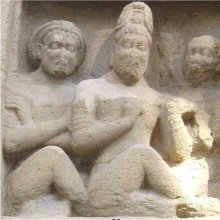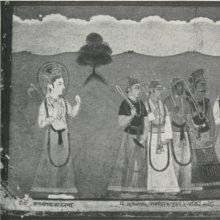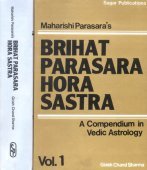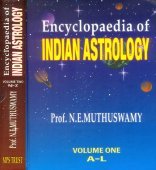Jaimini: 16 definitions
Introduction:
Jaimini means something in Hinduism, Sanskrit. If you want to know the exact meaning, history, etymology or English translation of this term then check out the descriptions on this page. Add your comment or reference to a book if you want to contribute to this summary article.
Images (photo gallery)
In Hinduism
Purana and Itihasa (epic history)
Source: archive.org: Puranic Encyclopedia1) Jaimini (जैमिनि).—General Information. A hermit of the highest degree of learning. In the "History of Classical Sanskrit Literature" it is mentioned that Sumantu, Jaimini, Paila, Vaiśampāyana and Śuka were the five important disciples of Vyāsa. Of these Śuka was the son of Vyāsa. In Devī Bhāgavata, it is mentioned that Vyāsa had other disciples also in his hermitage, such as Asita, Devala and others. The five disciples mentioned first gave publication to the work of Vyāsa called 'Jaya', which was the original of the Mahābhārata. Vaiśampāyana and Jaimini made some additions to the work 'Jaya'. In Sanskrit there is another book called Jaimini Bhārata, which contains only Aśvamedha Parva. (See under Guruparamparā). Other details. (1) It is mentioned in Brahmāṇḍa Purāṇa, Chapter 1 that Brahmāṇḍa Purāṇa is the story told by Jaimini to Hiraṇyanābha at Naimiśāraṇya.
Jaimini was present at the sarpasatra (sacrifice to kill serpents) of Janamejaya. (Mahābhārata Ādi Parva, Chapter 53, Stanza 6).
Jaimini had been a member of the council of Yudhiṣṭhira. (Mahābhārata Śabhā Parva, Chapter 4, Stanza 11).
This hermit visited Bhīṣma in his bed of arrows during the Bhārata Battle. (Mahābhārata Śānti Parva, Chapter 46, Stanza 7). (See full article at Story of Jaimini from the Puranic encyclopaedia by Vettam Mani)
2) Jaimini (जैमिनि).—The priest of Subāhu the King of the Cholas (Colas). In accordance with the advice of this priest the King performed many good deeds and consequently attained heaven. (Padma Purāṇa, Chapter 94).
Source: Cologne Digital Sanskrit Dictionaries: The Purana Index1a) Jaimini (जैमिनि).—A pupil of Vyāsa in charge of Sāma Veda (Chandogasamhitā). Was invited for Yudhiṣṭhira's Rājasūya. His disciple was Hiraṇyanābha;1 a Śrutaṛṣi who taught his son Sumantu;2 an authority on Yoga.3
- 1) Bhāgavata-purāṇa I. 4. 21; IX. 12. 3; X. 74. 8; XII. 6. 53 and 75. Vāyu-purāṇa 60. 13, 18; 61. 26; Viṣṇu-purāṇa III. 4. 9.
- 2) Brahmāṇḍa-purāṇa II. 1. 13; 34. 4 and 13; 35. 48; III. 33. 7; 35. 3; Viṣṇu-purāṇa III. 6. 1-2.
- 3) Vāyu-purāṇa 88. 207; Viṣṇu-purāṇa IV. 4. 107.
1b) A Lāngala.*
- * Vāyu-purāṇa 61. 42.
Jaimini (जैमिनि) is a name mentioned in the Mahābhārata (cf. I.48.6, I.53) and represents one of the many proper names used for people and places. Note: The Mahābhārata (mentioning Jaimini) is a Sanskrit epic poem consisting of 100,000 ślokas (metrical verses) and is over 2000 years old.

The Purana (पुराण, purāṇas) refers to Sanskrit literature preserving ancient India’s vast cultural history, including historical legends, religious ceremonies, various arts and sciences. The eighteen mahapuranas total over 400,000 shlokas (metrical couplets) and date to at least several centuries BCE.
Pancaratra (worship of Nārāyaṇa)
Source: Shodhganga: Iconographical representations of Śiva (pancaratra)Jaimini (जैमिनि) or Jaiminisaṃhitā is the name of a Vaiṣṇava Āgama scripture, classified as a tāmasa type of the Muniprokta group of Pāñcarātra Āgamas. The vaiṣṇavāgamas represent one of the three classes of āgamas (traditionally communicated wisdom).—Texts of the Pāñcara Āgamas are divided in to two sects. It is believed that Lord Vāsudeva revealed the first group of texts which are called Divya and the next group is called Muniprokta which are further divided in to three viz. a. Sāttvika. b. Rājasa. c. Tāmasa (e.g., Jaimini-saṃhitā).

Pancaratra (पाञ्चरात्र, pāñcarātra) represents a tradition of Hinduism where Narayana is revered and worshipped. Closeley related to Vaishnavism, the Pancaratra literature includes various Agamas and tantras incorporating many Vaishnava philosophies.
Vaishnavism (Vaishava dharma)
Source: Pure Bhakti: Brhad BhagavatamrtamJaimini (जैमिनि) refers to:—Narrator of Śrī Bṛhadbhāgavatāmṛta to Śrī Janamejaya, the son of Śrī Parīkṣit. He is a prominent disciple of Śrī Dvaipāyana Vyāsa-deva and author of the Pūrva-mimāṃsā. (cf. Glossary page from Śrī Bṛhad-bhāgavatāmṛta).

Vaishnava (वैष्णव, vaiṣṇava) or vaishnavism (vaiṣṇavism) represents a tradition of Hinduism worshipping Vishnu as the supreme Lord. Similar to the Shaktism and Shaivism traditions, Vaishnavism also developed as an individual movement, famous for its exposition of the dashavatara (‘ten avatars of Vishnu’).
Yoga (school of philosophy)
Source: Brill: Śaivism and the Tantric Traditions (yoga)Jaimini (जैमिनि) refers to one of the seven Sages, according to the 17th-century Haṭhayogasaṃhitā: a compilation on Haṭhayoga that borrows extensively from the Haṭhapradīpikā. The opening verses (1.2–3) acknowledge the seven sages, namely Mārkaṇḍeya, Bharadvāja, Marīci, Jaimini, Parāśara, Bhṛgu and Viśvāmitra, for spreading Haṭhayoga in the world. [...] The Haṭhayogasaṃhitā appears to have been the basis of the Gheraṇḍasaṃhitā (eighteenth century), [...]

Yoga is originally considered a branch of Hindu philosophy (astika), but both ancient and modern Yoga combine the physical, mental and spiritual. Yoga teaches various physical techniques also known as āsanas (postures), used for various purposes (eg., meditation, contemplation, relaxation).
General definition (in Hinduism)
Source: archive.org: Vedic index of Names and SubjectsJaimini (जैमिनि) does not appear till the Sūtra period. But a Jaiminīya-saṃhitā of the Sāmaveda is extant, and has been edited and discussed by Caland; and a Jaiminīya-brāhmaṇa, of which a special section is the Jaiminīya-upaniṣad-brāhmaṇa, is known and has formed the subject of several articles by Oertel.
Languages of India and abroad
Sanskrit dictionary
Source: DDSA: The practical Sanskrit-English dictionaryJaimini (जैमिनि).—Name of a celebrated sage and philosopher, founder of the Mīmāṃsā school of philosophy (properly pūrvamīmāṃsā); मीमांसाकृतमुन्ममाथ सहसा हस्ती मुनिं जैमिनिम् (mīmāṃsākṛtamunmamātha sahasā hastī muniṃ jaiminim) Pañcatantra (Bombay) 2.23.
Derivable forms: jaiminiḥ (जैमिनिः).
Source: Cologne Digital Sanskrit Dictionaries: Shabda-Sagara Sanskrit-English DictionaryJaimini (जैमिनि).—m.
(-niḥ) The name of a celebrated saint and philosopher, the pupil of Vyasa, and founder of the Purva Mimansa school, which is commented by Savaraswami.
Source: Cologne Digital Sanskrit Dictionaries: Benfey Sanskrit-English DictionaryJaimini (जैमिनि).—m. The name of a philosopher, the founder of the Pūrva Mīmānsā school, [Pañcatantra] ii. [distich] 34.
Source: Cologne Digital Sanskrit Dictionaries: Cappeller Sanskrit-English DictionaryJaimini (जैमिनि).—[masculine] [Name] of a saint and philosopher.
Source: Cologne Digital Sanskrit Dictionaries: Aufrecht Catalogus Catalogorum1) Jaimini (जैमिनि) as mentioned in Aufrecht’s Catalogus Catalogorum:—Mīmāṃsāsutra. Quoted in it 3, 1, 4. 8, 3, 7. 9, 2, 39. 12, 1, 7. Jaiminisūtra jy. Upadeśasūtra jy. Gaṇapativedapādastotra. K. 204. Dvādaśabhāva jy.
2) Jaimini (जैमिनि):—pupil of Caitanya: Bhāgavatāmṛta.
Source: Cologne Digital Sanskrit Dictionaries: Monier-Williams Sanskrit-English DictionaryJaimini (जैमिनि):—[from jaitra] m. (= mani) Name of a celebrated sage and philosopher (he was a pupil of Vyāsa [who made over to him the [Sāma-veda; Bhāgavata-purāṇa i, 4, 21; Vāyu-purāṇa]] [Sāma-vidhāna-brāhmaṇa; Mahābhārata if., xii]; and was Udgātṛ priest at Janamejaya’s snake-sacrifice, i, 2046; and was founder of the Pūrvaor Karma-Mīmāṃsā, [Pañcatantra; Madhusūdana]), [Āśvalāyana-gṛhya-sūtra iii, 4; Śāṅkhāyana-gṛhya-sūtra; Pravara texts i, 4; iv, I; Harivaṃśa; Bādarāyaṇa’s Brahma-sūtra etc.]
Source: Cologne Digital Sanskrit Dictionaries: Yates Sanskrit-English DictionaryJaimini (जैमिनि):—(niḥ) 2. m. A celebrated sage, pupil of Vyāsa, and founder of the Uttara Mimansa school.
[Sanskrit to German]
Sanskrit, also spelled संस्कृतम् (saṃskṛtam), is an ancient language of India commonly seen as the grandmother of the Indo-European language family (even English!). Closely allied with Prakrit and Pali, Sanskrit is more exhaustive in both grammar and terms and has the most extensive collection of literature in the world, greatly surpassing its sister-languages Greek and Latin.
See also (Relevant definitions)
Starts with (+1): Jaiminibhagavata, Jaiminibharata, Jaiminibharata ashvamedhaparvan, Jaiminibrahmana, Jaiminikadara, Jaiminikoshasutra, Jaiminimatam, Jaimininighantu, Jaiminipurane jyeshthamahatmyam, Jaiminisamhita, Jaiminishrautasutra, Jaiminismriti, Jaiministotra, Jaiminisutra, Jaiminisutrakarika, Jaiminiya, Jaiminiyabrahmana, Jaiminiyamata, Jaiminiyanyayamalavistara, Jaiminiyarthasamgraha.
Full-text (+600): Jaiminiya, Aitishayana, Mimamsa, Anuprasarpin, Dvaiyahakalya, Yogasiddhi, Dvyamnata, Jaiminisutra, Punarabhyunnita, Antahkratu, Dravyavattva, Aupanuvakya, Phalasamyoga, Avaidya, Niravadana, Parisamapaniya, Dvyadhana, Paradaurbalya, Arthadravyavirodha, Yathapradanam.
Relevant text
Search found 99 books and stories containing Jaimini; (plurals include: Jaiminis). You can also click to the full overview containing English textual excerpts. Below are direct links for the most relevant articles:
Brahma Sutras (Shankara Bhashya) (by Swami Vireshwarananda)
Chapter IV, Section III, Adhikarana III < [Section III]
Chapter IV, Section III, Adhikarana V < [Section III]
Chapter I, Section II, Adhikarana VII < [Section II]
Brihad Bhagavatamrita (commentary) (by Śrī Śrīmad Bhaktivedānta Nārāyana Gosvāmī Mahārāja)
Verse 2.1.4 < [Chapter 1 - Vairāgya (renunciation)]
Verse 2.1.25 < [Chapter 1 - Vairāgya (renunciation)]
Verse 1.1.12 < [Chapter 1 - Bhauma (the earthly plane)]
Mimamsa interpretation of Vedic Injunctions (Vidhi) (by Shreebas Debnath)
Chapter 4.1 - Subordinateness (Aṅgatva)
Chapter 10.3 - Modern Definition and Jaimini’s Definition of Law
Authorship and Date of Brahma Sutra < [April 1971]
Is Vyasa the Same as Badarayana? < [April – June and July – September, 1996]
Other Reviews < [October 1958]
Formal Education System in Ancient India (by Sushmita Nath)
The Gurukula centre of learning < [Chapter 3 - Centres of Learning in Vedic and Buddhist Period]
Meaning of the word Saṃskāra < [Chapter 2 - Rituals of the Education System]
Puranic encyclopaedia (by Vettam Mani)
Related products






